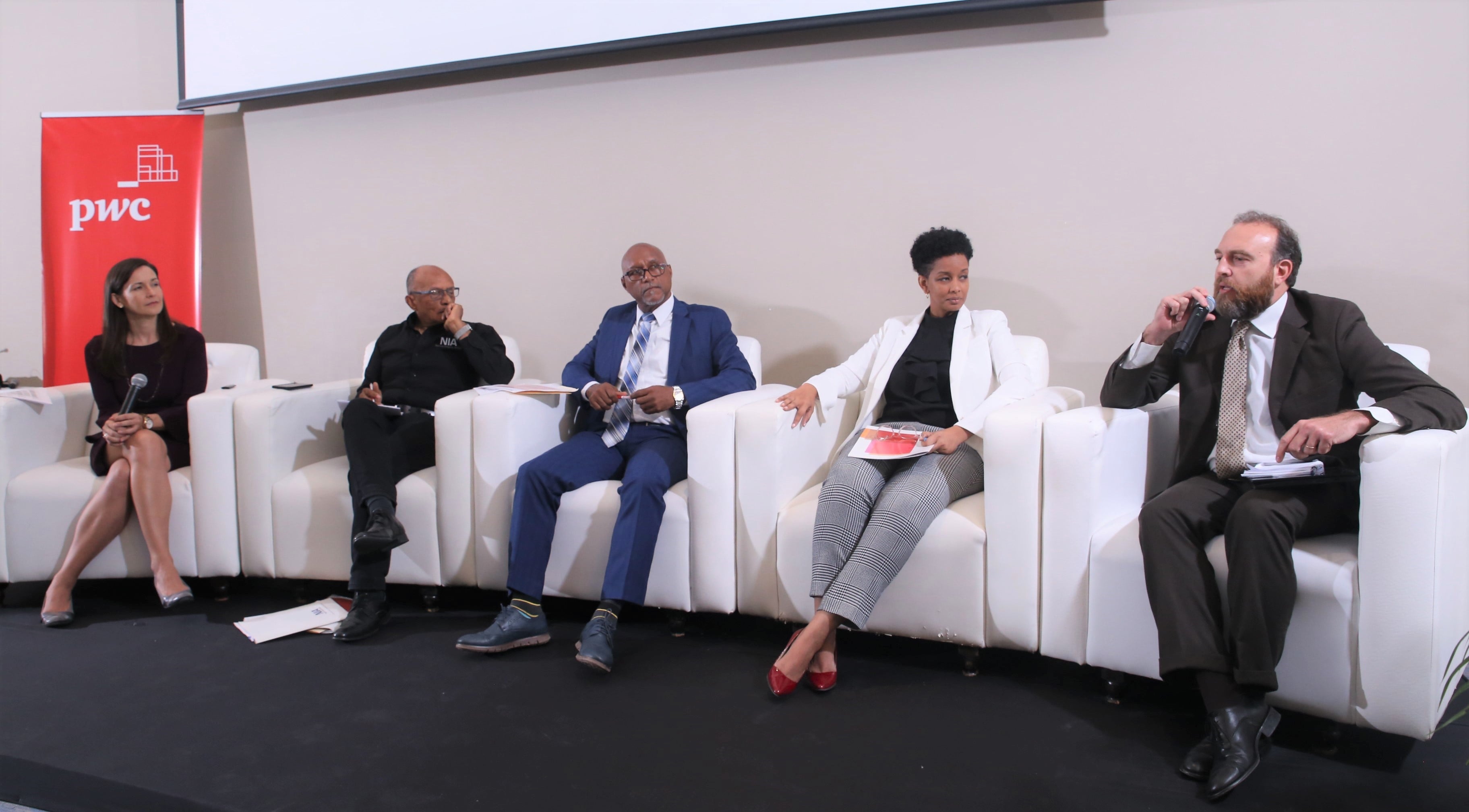PwC hosts governance and integrity seminar for public and private sector
15 July, 2019, Kingston, Jamaica - PwC hosted a governance and transparency seminar on Friday, (12 July) to discuss the importance of leadership and accountability to improve governance and integrity in Jamaica. The firm assembled a diverse panel of speakers to share insights, trends and concrete actions that public and private sector entities can take to reduce risks related to fraud and corruption and emerge stronger when issues arise.
Seminar encouraged a solutions-focused discussion.
The panel included Professor Trevor Munroe, Executive Director of the National Integrity Action; Francesco De Simone, Specialist – Modernisation of the State for the Inter-American Development Bank; Lloyd Parchment, Co-Chair, Anti-Fraud Committee of the Jamaica Bankers Association; and Heather Pinnock, General Manager of the Urban Development Corporation. Jessica Shannon, Forensics Leader for PwC firms operating in the Caribbean, moderated the session.
Leighton McKnight, Territory Leader for PwC Jamaica and Regional Advisory Leader for PwC firms operating in the Caribbean provided opening remarks and set the stage for the discussion stating, “The issue of corruption in Jamaica is real, …but it is now time to face it so we can fix it.” Ms. Shannon built upon the call for solutions, sharing statistics from PwC’s Global Fraud & Economic Crime Survey, stating that “technology is increasingly utilised as a tool for transparency, combatting fraud and corruption across the public and private sectors.”
Panelists were then asked to share their perspectives on concrete actions that could be taken to prevent, detect and address fraud and corruption risks to promote strong transparency, accountability, and governance across the Jamaican landscape.
Panelist perspectives were wide ranging.
Against the backdrop of an increased focus on growing the economy, Professor Munroe provided his perspective on how the country can further reduce corruption and improve its perception on Transparency International’s Corruption Perceptions Index (CPI). He implored the audience to band together in the fight against corruption, noting the hopes of strengthening Jamaica depends on the ability to manage corruption. He urged citizens and government agencies to open the dialogue and become more active and vocal participants. Further, he urged government officials and agencies designed to combat corruption to become more forthcoming and transparent.
Mr. De Simone continued by shared similarities and differences with respect to Jamaica’s corruption challenges relative to other countries region. He highlighted technology as an enabler, including the Investment Map, an Inter-American Development Bank led initiative currently being launched in Jamaica that uses geo-references to enable the public to track the funding of investment projects. Mr. De Simone also advised that international standards were a critical benchmark and set of guidelines in the fight on corruption. While he cautioned that the issue of corruption in Jamaica was very complex, he expressed optimism about the ability to address it.
Moving beyond the government context, Mr. Parchment discussed measures the private sector, and in particular the banking sector and its customers, are taking to protect themselves from fraud. Noting increasing vulnerability to threats such as debit card fraud, cheque fraud, refund fraud and wire transfer fraud, he indicated that it is incumbent upon all stakeholders to employ enhanced security measures and early reporting. He specifically cited the use of anti-virus and anti-malware tools by Jamaican companies such as Smart Automated Banking Machines (ABM), tokenisation on internet banking platforms and public education campaigns to reduce fraud exposure.
Ms. Pinnock discussed the importance of strong leadership in driving changes to increase transparency, accountability, and good governance. She shared that it was critical to remain actively engaged with all stakeholders throughout the process and to be consistent in messages and action. Acknowledging that change required patience, she also noted the need for persistence and the importance of instilling a culture of pride. Ms. Pinnock shared personal stories and experiences of employees at the UDC, impressing upon the audience the need for empathy. Finally, Ms. Pinnock encouraged leaders to learn the lesson she took from someone well respected, to “Never to waste a crisis.”, using it instead to drive true transformational change and emerge stronger.
A call to action.
PwC and the panelists were unified in a clear message – the time is now to address fraud and corruption in Jamaica and improving governance, transparency and accountability are key requirements in this fight.

Panelists at PwC’s Governance and Transparency seminar share perspectives and insights. (Left to right), Moderator, Jessica Shannon, Forensics Leader for PwC firms operating in the Caribbean; Professor Trevor Munroe, Executive Director of the National Integrity Action; Lloyd Parchment, Co-Chair, Anti-Fraud Committee of the Jamaica Bankers Association; Heather Pinnock, General Manager of the Urban Development Corporation and Francesco De Simone, Specialist – Modernisation of the State for the Inter-American Development Bank.
About PwC
At PwC, our purpose is to build trust in society and solve important problems. We’re a network of firms in 156 countries with over 295,371 people who are committed to delivering quality in assurance, advisory and tax services. Find out more and tell us what matters to you by visiting us at www.pwc.com/jm
PwC refers to the Jamaica member firm and may sometimes refer to the PwC network. Each member firm is a separate legal entity. Please see www.pwc.com/structure for further details.
© 2021 PricewaterhouseCoopers. All rights reserved.
Contact us
Toni-Ann Reid
Manager Marketing and Communications, PwC Jamaica
Tel: +1 (876) 922 6230 | Ext.7256


